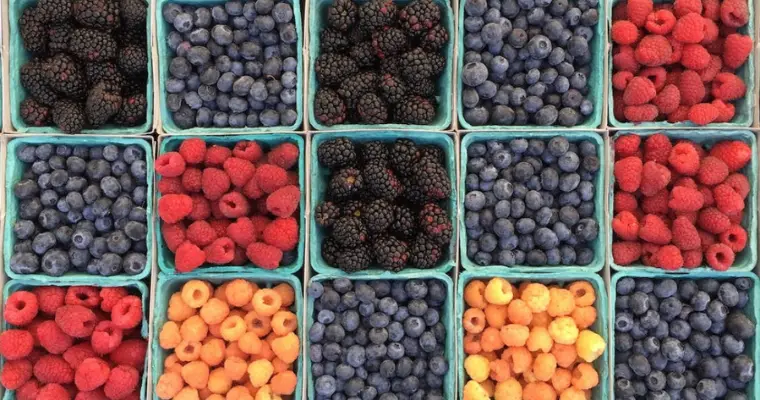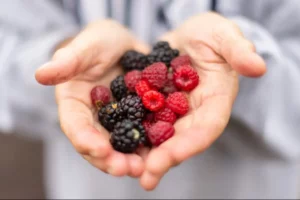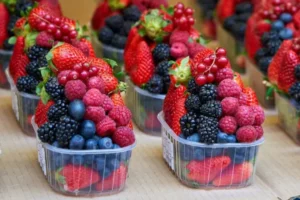Using Edible Berries

A Burst of Health and Flavor
At Plantaful Life we celebrate the incredible benefits of a Whole Food Plant-Based lifestyle. In this blog post, we’re diving into the different ways of using edible berries and their role in a plant-based diet.
Bursting with vibrant colors, delectable flavors, and many health benefits, edible berries are a true gift from nature. Whether you enjoy them fresh, frozen, or blended into smoothies, these tiny powerhouses are packed with nutrients that can support your overall well-being.
Join us as we explore the wonderful world of berries and discover why they should be a staple in your plant-based kitchen.
 Using Edible Berries in your Diet
Using Edible Berries in your Diet
Antioxidant-Rich Delights:
Using Berries, such as strawberries, blueberries, raspberries, and blackberries, are abundant in antioxidants. These powerful compounds help protect our cells from damage caused by harmful free radicals.
Antioxidants play a crucial role in reducing inflammation, supporting heart health, and strengthening our immune system.
Including berries in your diet can provide a natural defense against chronic diseases and promote longevity.
A Nutrient Powerhouse:
Not only are berries rich in antioxidants, but they also boast an impressive nutrient profile. These colorful fruits are low in calories and high in fiber, making them a fantastic addition to a weight-conscious plant-based diet.
Fiber aids digestion, promotes satiety, and helps regulate blood sugar levels. Additionally, berries contain essential vitamins and minerals, including vitamin C, vitamin K, manganese, and folate.
These nutrients contribute to optimal health and support various bodily functions.
Gut Health Heroes:
Maintaining a healthy gut is vital for overall well-being, and berries can play a significant role in nurturing our gut microbiota. The fiber found in berries acts as a prebiotic, providing nourishment for the beneficial bacteria in our digestive system.
A thriving gut microbiome is associated with improved digestion, enhanced nutrient absorption, and a stronger immune system. By enjoying a variety of berries, you’re fostering a healthy gut environment, which can have a positive impact on your overall health.
Heart-Friendly Allies:
Heart disease is a leading cause of mortality worldwide, but a plant-based diet rich in berries can help reduce the risk factors associated with this condition.
Berries contain flavonoids, particularly anthocyanins, which have been linked to a lower risk of heart disease. These compounds help improve blood flow, reduce inflammation, lower blood pressure, and enhance the health of our blood vessels.
Including berries in your meals and snacks can contribute to a healthy heart and a vibrant cardiovascular system.
Brain Boosters:
Cognitive health is a priority at every stage of life, and berries have shown promising effects on brain function. The antioxidants and anti-inflammatory properties in berries help protect brain cells from oxidative stress and inflammation, which are associated with cognitive decline.
Studies suggest that regular berry consumption may improve memory, enhance brain function, and potentially reduce the risk of neurodegenerative diseases.
By incorporating berries into your diet, you’re nourishing your brain and supporting long-term cognitive health.
Versatile and Delicious:
One of the best things about using edible berries are their versatility in the kitchen. From adding them to salads and oatmeal to creating mouthwatering desserts and refreshing smoothies, the possibilities are endless.
Their natural sweetness can satisfy your cravings for sugary treats while providing essential nutrients. Experiment with different berry combinations to create a symphony of flavors in your plant-based meals and savor the delight of these wholesome treats.

Our lists of the Edible Berries
- Strawberries: These vibrant red berries are not only delicious but also packed with vitamin C, manganese, and antioxidants. They are known for their sweet and slightly tangy flavor, making them a versatile ingredient in smoothies, salads, desserts, and even savory dishes.
- Blueberries: True super food, bursting with antioxidants, particularly anthocyanins, which have been linked to numerous health benefits. They are low in calories, high in fiber, and offer a delightful balance of sweet and tangy flavors. Add them to your breakfast bowls, muffins, or enjoy them as a refreshing snack.
- Raspberries: With their delicate texture and sweet-tart taste, raspberries are a delightful addition to any plant-based diet. These berries are a great source of fiber, vitamin C, and antioxidants. Sprinkle them on your morning cereal, blend them into smoothies, or use them to create delectable desserts.
- Blackberries: These berries are not only rich in antioxidants but also provide a good amount of fiber, vitamin K, and manganese. These dark, juicy berries have a slightly sweet and earthy flavor. Enjoy them on their own, toss them in salads, or use them in baked goods for a burst of flavor.
- Cranberries: Known for their tart taste and are often associated with holiday meals. These berries are packed with vitamin C, fiber, and antioxidants. While they are commonly enjoyed in sauces or juices, dried cranberries make a delicious addition to salads, trail mixes, or baked goods.
- Acai berries: These have gained popularity lately for their high antioxidant content and potential health benefits. These small, dark purple berries have a unique flavor profile that combines notes of berries and chocolate. Acai bowls and smoothies have become popular ways to enjoy their nutritional goodness.
- Goji berries: Also known as wolfberries, are native to Asia and have been used in traditional Chinese medicine for centuries. These bright orange-red berries are loaded with antioxidants, vitamins, and minerals. Goji berries have a mildly sweet and tangy flavor, making them a great addition to trail mixes, oatmeal, or as a topping for salads.
Our List Continued of Not so Common.
- Elderberries: Rich purple-black hue and are known for their immune-boosting properties. They are a good source of vitamin C, antioxidants, and flavonoids. While elderberries are often used to make syrups or jams, they can also be incorporated into baked goods or enjoyed in herbal teas.
- Mulberries: Unique berries that come in various colors, including black, red, and white. They are packed with vitamins, minerals, and antioxidants. Mulberries have a sweet and slightly tart flavor and are often enjoyed dried, sprinkled on top of yogurt, or used in smoothies and desserts.
- Boysenberries: A cross between raspberries, blackberries, and loganberries. These dark purple berries are rich in antioxidants, vitamin C, and dietary fiber. Boysenberries have a sweet-tart taste and can be enjoyed fresh, in jams, or used in pies and cobblers.
- Lingonberries: Small red berries that are commonly found in Nordic countries. They are rich in antioxidants, vitamins, and minerals. Lingonberries have a tart flavor and are often used in jams, sauces, or as a condiment for savory dishes.
- Marionberries: A type of blackberry that originated in Oregon, USA. They are known for their exceptional flavor and high antioxidant content. Marionberries have a sweet and tangy taste and are perfect for enjoying fresh, in jams, or as a flavorful addition to pies and pastries.
- Huckleberries: Small, round berries that are similar in appearance to blueberries. They are native to North America and have a slightly tart flavor with a hint of sweetness. Huckleberries are rich in antioxidants and can be enjoyed fresh, used in jams, or added to baked goods.
- Black currants: Small, dark berries that are packed with vitamins, minerals, and antioxidants. They have a tart and slightly sweet flavor. Black currants are rich in vitamin C, anthocyanins, and polyphenols. They can be enjoyed fresh, used in jams and jellies, or incorporated into baked goods.
Special Mention Tropical Berry, a favorite of the Plantaful Life Team
Mysore Raspberry: (Rubus niveus), also known as Hill raspberry, is a unique raspberry variety that thrives in tropical and subtropical regions like Hawaii. With its vibrant red color and sweet-tangy flavor,
Mysore raspberries offer a taste of the tropics. They grow well in the warm and humid climate, making them a special treat for those seeking raspberries in tropical areas.
Cultivate them in well-drained soil, provide ample sunlight, and enjoy their versatile use in smoothies, jams, and desserts. Packed with vitamins, minerals, fiber, and antioxidants, Mysore raspberries provide a nutritious boost to a plant-based lifestyle.
Honorable Mention another one of our favorites
Strawberry guava: Also known as waiawi, is a small fruit that resembles a strawberry in shape and has a distinct tropical flavor. It has a sweet and tart taste with a hint of strawberry and guava notes.
While it may not fit the precise botanical definition of a berry, strawberry guava is often referred to as a “guava berry” due to its small size and the way it is commonly consumed. Strawberry guava is rich in vitamin C, antioxidants, and dietary fiber. It can be enjoyed fresh, used in jams, jellies, or incorporated into desserts and beverages.
Additionally, it’s sweet and tangy flavor profile, combined with its tropical essence makes it a beloved fruit in Hawai’i.
Using Edible Berries from our list is merely a glimpse into the astonishing array of the fruits accessible to you for a well-rounded Whole Food Plant-Based diet.
Incorporate them into your meals, snacks, and desserts to reap their nutritional benefits and indulge in their delightful flavors.
Be sure to sign up for your > Free 12 Tips Food Guide <
Conclusion:
In conclusion, Using Edible Berries in your Whole Food Plant-Based diet opens up a whole new world of options. With their exceptional health benefits, vibrant colors, and delectable flavors they are an absolute must-have in your journey.
Furthermore, protecting your cells with antioxidants to nurturing your gut and boosting brain health these tiny fruits offer a myriad of benefits. So, next time you visit the grocery store or the farmers market, make sure to grab a handful of berries and infuse your meals with their goodness. Your taste buds and your body will thank you for it! #plantafullife
Embrace the power of using edible berries and experience the abundance of health and flavor they bring to your life!
Cheers,
Plantaful Life Team
Disclaimer: The information shared in this blog post and on our website is for educational and informational purposes only. We are here to inspire and support you on your plant-based journey. However, always prioritize your health and consult with your trusted healthcare provider for personalized advice. By using our website, you acknowledge and agree that you have read and understood this medical disclaimer, and you acknowledge the significance of seeking professional medical advice for your specific health needs.
References:
Harvard T. H. Chan School of Public Health
 Using Edible Berries in your Diet
Using Edible Berries in your Diet
Hello Plantaful Life
Thank you for this great article about edible berries. I really enjoyed reading it. I love strawberries and blueberries but I don’t like raspberries. After reading your article I’m going to consider trying some of the other berries on your list. I also really enjoyed reading about all the benefits of eating berries like the nutrients and antioxidants you get from them. I have bookmarked your article and I will be referring back to it in the future. Thank you again for this great article about edible berries.
Regards
Timothy
Hello Timothy,
You are welcome, we are happy you found the post on Edible Berries a helpful resource. You mentioned not liking raspberries here is a suggestion try to find the Mysore varietal, they are a completely different experience black in color, super sweet and taste nothing like a traditional sour forward raspberry.
Thank you again for taking your time to leave us a comment.
Cheers, Planatful Life
Hello,
I enjoyed reading this interesting article on using edible berries. I am a fan of berries! I eat blueberries everyday in my breakfast oatmeal! And I love smoothies! A banana and just about any other berries make wonderful flavored smoothies. I like mine with almond or coconut milk, and maybe some yogurt.
When we were kids we used to pick the elderberries, blueberries, and huckleberries. While trying not to eat then faster than we picked them, we brought them home for mom to make wonderful pies and elderberry jelly, yum!
I have not heard of some of these berries, like the Marionberries, Mysore Raspberry and the Strawberry Guava, but they sound wonderful and I will be searching for them now! Are these fruits in season with the american raspberries?
Thank you for such an interesting article!
We’re thrilled that you found our article interesting. It’s great to hear that you incorporate berries into your daily routine, and we share your love for banana smoothies as we promote a lifestyle centered around fruits and vegetables.
We understand that the Marionberry might not be familiar to everyone, as it is a lesser-known Blackberry variety primarily found in the Pacific Northwest of the US. However, we can assure you that it’s a delightfully plump and incredibly delicious berry.
Regarding the Mysore raspberry and the Strawberry Guava, it’s intriguing that both of these fruits are considered invasive species here in Hawai’i. Here at the Plantaful Life Garden, we grow them, but they are not widely cultivated for commercial purposes due to their adaptation to tropical climates.
Thank you once again for sharing your thoughts with us. Your feedback is truly appreciated!
Cheers, Plantaful Life